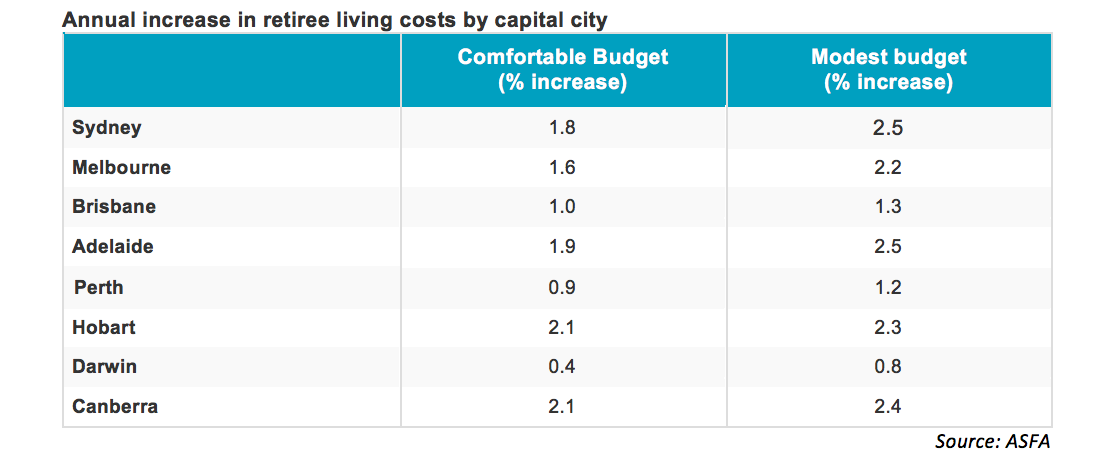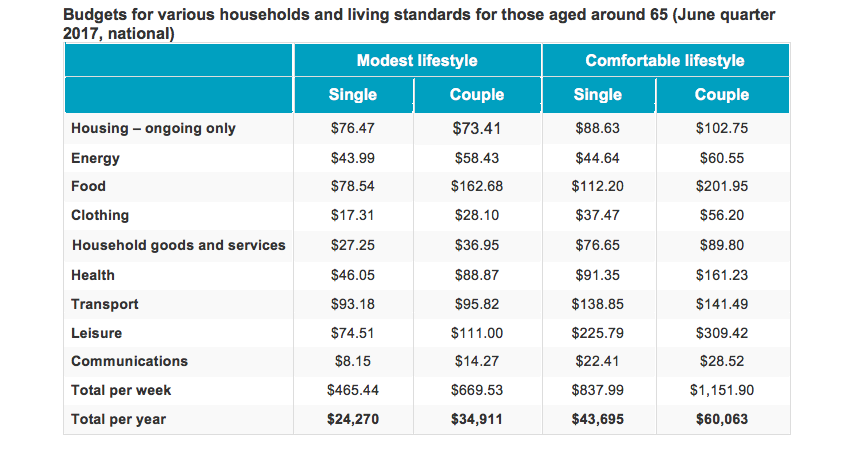More retirees are doing it tough
Summary: The Association of Superannuation Funds (ASFA) has released new budgets for retired singles and couples required to have modest or comfortable lifestyles. There are some surprises in cities under pressure, as well as perhaps the type of retiree feeling price pinches the most.
Key take-out: Superannuation should be taken more seriously by those who seek a comfortable retirement. Inflation may seem to have stabilised, but costs are increasing for retirees on smaller budgets especially as the essentials get more expensive.
Costs have ballooned for retirees, with a new study revealing those on modest budgets are finding it increasingly tougher to just get by.
That's especially the case for those living in Sydney, Adelaide, Hobart and Canberra.
While prices for basic goods and services stayed relatively steady during the most recent June quarter, the year didn't add up all too well for retirees on modest, or slim, budgets nationwide, according to new figures released by industry peak body, the Association of Superannuation Funds of Australia (ASFA).
On average, costs of living increased 2.1 per cent for those living modestly, against a 1.5 per cent increase those in the comfortable retirement bracket experienced. This compares to a 1.9 per cent increase in the general Consumer Price Index (CPI).

How much do you need now?
This all comes as ASFA releases new budgets to allow for either ‘comfortable' or ‘modest' retirements, on the assumption a retiree fully owns their home.
To be comfortable, the figures reveal couples aged 65 and over need to spend $60,063 per year and singles $43,695, up 0.2 per cent on the previous quarter. For those in the same age bracket sustained on basic budgets, singles need to spend $24,270 per year and couples $34,911 to essentially get by, which is 0.1 per cent more than the previous quarter.
“The cost of retirement over the most recent quarter only increased by a relatively small amount and that is welcome news but many retirees are still finding it difficult to achieve a comfortable standard of living in retirement,” ASFA CEO Martin Fahy warns.
“The pension is not enough. In particular, retirees with health care needs are facing significant increases in costs. The costs of electricity and gas and of council and water rates are a serious concern for many.”
Fahy is calling for people to become “super skilled” to prevent major financial stress, which includes brushing up on the compound interest and tax savings delivered by superannuation.
What's costing more and less?
Blame the price spikes in the most recent quarter on medical and hospital services, which shot up 4.1 per cent, reflecting the annual increase in private health insurance premiums on 1 April.
Domestic holiday travel and accommodation helped offset some of this, shedding around 3.2 per cent, while fuel was down 2.5 per cent and fruit down 4.3 per cent.
Fuel is in the biggest state of flux, yo-yoing from 0.8 per cent to 0.2 per cent from April to May. And it should be added that domestic holiday spending is expected to drop off in the June quarter, being off-peak season.
ASFA director of research, Ross Clare, says with the necessities forming the basis of budgets at the modest level, these people saw the biggest increases in items they can't do anything about.

What should we do?
Clare, who has been crunching these numbers for several years, said a little over 20 per cent of the retired Australian population fits into ASFA's ‘comfortable' bracket. That's a good start, but he believes superannuation is the critical component to further raise the bar.
“If the compulsory system matures there will be more people at that comfortable level, around 50 per cent of the population by 2050-2055, and that's a function of getting the superannuation guarantee up to 12 per cent and having more people in the system for more of their working lives,” says Clare.
“It's important to consolidate accounts, and make sure you have the right levels of insurances, which might be more or less than you currently have.
"Young people can't claim on income protection twice so they should look into their fund fees. Salary sacrifice also still makes a lot of sense, and this all brings about the magic of compound interest.”
















